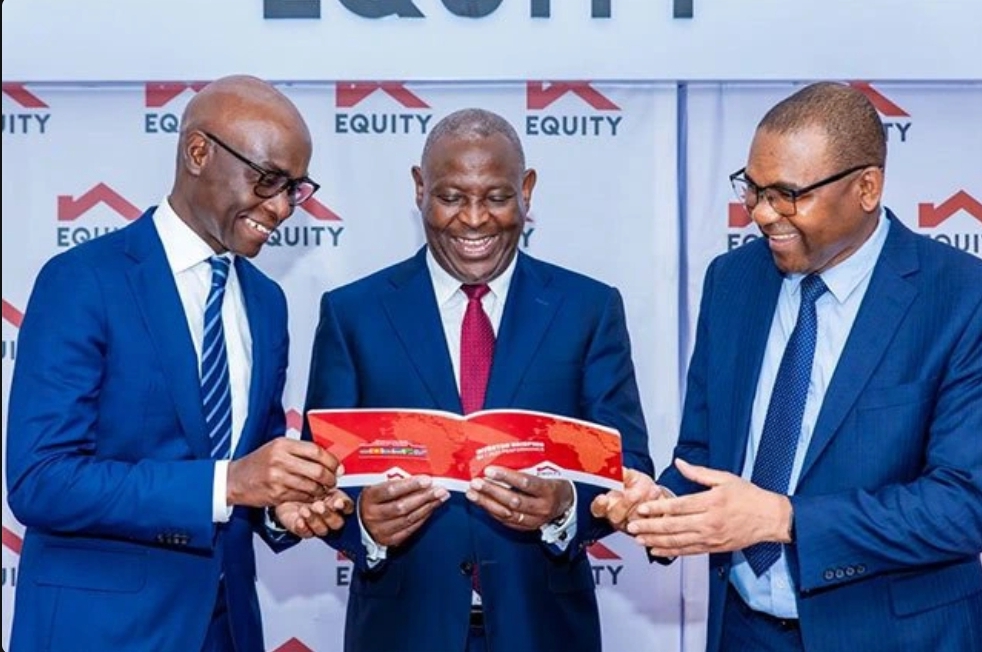Equity Group posts Shs 433.2bn profit

L-R: Equity Bank Uganda Executive Director, Claver Serumaga, Equity Group Managing Director and CEO, Dr. James Mwangi and Equity Bank Uganda Managing Director, Gift Shoko, during the Quarter One 2025 Investor Briefing event.
The lender’s digital channels processed 87% of all transactions, with the Equity Mobile App and USSD platform recording Shs 26.5 trillion in transaction value
Nairobi, Kenya | THE INDEPENDENT | Equity Group has reported solid financial results for the first quarter of 2025, underpinned by its regional expansion, diversified business model, and strong operational resilience amid a volatile global economic environment.
The Nairobi-headquartered financial services group said customer deposits rose 7% year-on-year to Shs 37.2 trillion ($9.7 billion), while net loans grew 3% to Shs 22.7 trillion. Total assets increased 4% to Shs 49.2 trillion, with the Group cementing its status as a systemic financial institution in East and Central Africa, ranking second in market position in Kenya, Rwanda, and the Democratic Republic of Congo.
Profit after tax stood at Shs 433.2 billion, supported by a return on equity of 23.9% and a return on assets of 3.5%. Stripping out one-off adjustments related to South Sudan’s hyperinflation accounting, profit before tax increased 8% to Shs 528.8 billion.
Chief Executive James Mwangi said the results reflected Equity’s ability to “navigate a dynamic macroeconomic landscape” through a strategy that integrates commercial growth with social and sustainability objectives. “Our regional footprint and non-banking subsidiaries continue to offer strong levers for growth,” Mwangi said in a statement.
The Group’s Kenyan operation remains its largest contributor, accounting for 51% of total revenue. The subsidiary posted a 7% rise in deposits to Shs 22.3 trillion and a 50% increase in profit before tax, as total revenue climbed 19% and non-funded income rose 23% to UGX 213 billion. Return on assets and equity improved to 3.4% and 26.0% respectively.
Outside Kenya, regional units delivered a robust performance, accounting for 47% of total assets, 48% of net loans, and 45% of profit before tax. In DRC, EquityBCDC grew customer loans and deposits by 9% and 8% respectively, while focusing on key sectors such as agriculture, manufacturing, and small businesses. Tanzania’s unit posted a 540% surge in profit before tax, with deposits and loans up 14% and 9% respectively, while Rwanda and Uganda also contributed to the Group’s overall momentum.
Net interest income rose 3% to Shs 804.2 billion, while total expenses declined 1% to Shs 830.8 billion. The Group’s non-performing loan (NPL) ratio stood at 14%, below the industry average of 17.2%, with coverage at 67%.
Non-banking operations recorded growth
Equity’s non-banking operations — including fintech, insurance, and investment banking — continue to deepen the Group’s value proposition. Profit before tax for the insurance unit rose 27% to Shs 11.7 billion, with 80% of the 15.3 million policies issued since March 2022 distributed through digital channels. The Group is currently seeking regulatory approval to add a health insurance license, complementing its life and general insurance operations.
The investment banking arm saw a 142% jump in profitability, while the technology division recorded a 10% increase, bolstering the Group’s diversification strategy.
Digital adoption across the Group’s platforms remains strong. Digital channels processed 87% of all transactions, with the Equity Mobile App and USSD platform recording Shs 26.5 trillion in transaction value, up from Shs 20.3 trillion a year earlier.
Equitel’s mobile platform handled 92 million transactions, up from 65.2 million, while the Group’s FX platform, EazzyFX, recorded Shs 830.3 billion in transaction volume. Merchant payments through Pay With Equity reached Shs 15.9 trillion, servicing over 1.1 million merchants.
The Group’s ONE Equity platform has further integrated banking services across digital channels, enabling greater cross-selling and customer engagement.
Africa Recovery and Resilience Plan
Equity’s performance is closely aligned with its Africa Recovery and Resilience Plan (ARRP), a private sector-led initiative aimed at catalysing inclusive growth across the continent. Through partnerships with institutions such as the African Development Bank, Microsoft, and Mastercard, the Group has launched digital tools such as the Community Pass platform to reach 10 million farmers. Collaborations with the World Food Programme and the African Guarantee Fund have expanded access to finance for smallholder farmers and MSMEs, particularly those led by women and youth.
To date, Shs 759.5 billion in guarantees have supported expanded lending to high-impact sectors. The Group has also disbursed Shs 9.9 trillion in financing to 350,149 MSMEs under the Young Africa Works initiative, providing entrepreneurship training to more than 650,000 small businesses.
Social impact remains a core part of Equity’s model. Through the Equity Leaders Program, the Group has supported nearly 30,000 scholars, including 113 currently enrolled in leading global universities. Technical and vocational training has reached nearly 4,000 scholars, while 9,700 paid internships have been provided.
Climate finance is also gaining traction, with Equity planting over 35 million trees and distributing nearly 500,000 clean energy products. Climate finance lending stands at Shs 759.5 billion, with the Group recognised by the International Finance Corporation as the financial institution with the highest number of climate-related transactions globally.
Equity Afia, the Group’s health delivery network, has recorded 3.66 million patient visits across 134 clinics, enhancing access to affordable care.
The Group’s efforts have garnered multiple accolades, including the “Superbrand” title in East Africa for the fourth time and 16 awards at the 20th Think Business Banking Awards, including CEO of the Year and top honours in categories such as SME Banking, Financial Literacy, and Agriculture Financing.
Mwangi concluded, “Our strategy is built on financial inclusion, regional diversification, and long-term sustainability. We are committed to enabling economic transformation across Africa, one household and one enterprise at a time.”



0 Comments